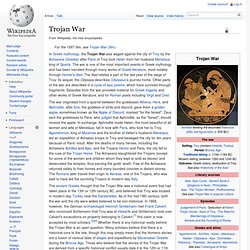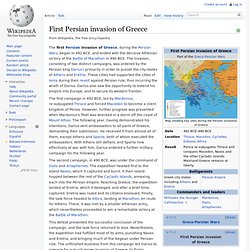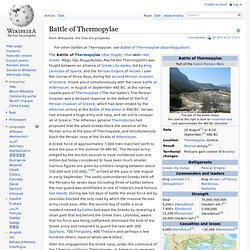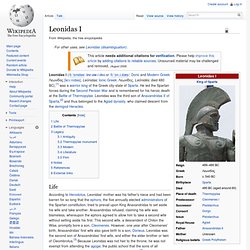

Trojan War. Sources The Burning of Troy (1759/62), oil painting by Johann Georg Trautmann.

First Persian invasion of Greece. The first Persian invasion of Greece, during the Persian Wars, began in 492 BCE, and ended with the decisive Athenian victory at the Battle of Marathon in 490 BCE.

The invasion, consisting of two distinct campaigns, was ordered by the Persian king Darius I primarily in order to punish the city-states of Athens and Eretria. These cities had supported the cities of Ionia during their revolt against Persian rule, thus incurring the wrath of Darius. Darius also saw the opportunity to extend his empire into Europe, and to secure its western frontier. The first campaign in 492 BCE, led by Mardonius, re-subjugated Thrace and forced Macedon to become a client kingdom of Persia. However, further progress was prevented when Mardonius's fleet was wrecked in a storm off the coast of Mount Athos. This defeat prevented the successful conclusion of the campaign, and the task force returned to Asia.
Sources[edit] Background[edit] Darius I of Persia, as imagined by a Greek painter, 4th century BCE. Battle of Marathon. The first Persian invasion was a response to Greek involvement in the Ionian Revolt, when Athens and Eretria had sent a force to support the cities of Ionia in their attempt to overthrow Persian rule.

The Athenians and Eretrians had succeeded in capturing and burning Sardis, but were then forced to retreat with heavy losses. In response to this raid, Darius swore to burn down Athens and Eretria. According to Herodotus, Darius asked for his bow, he placed an arrow upon the string and he discharged it upwards towards heaven, and as he shot into the air he said: "Zeus, grant me to take vengeance upon the Athenians! ". Also he charged one of his servants, to say to him, every day before dinner, three times: "Master, remember the Athenians.
Second Persian invasion of Greece. Battle of Salamis. Battle of Thermopylae. The Battle of Thermopylae (/θərˈmɒpɨliː/ thər-MOP-i-lee; Greek: Μάχη τῶν Θερμοπυλῶν, Machē tōn Thermopylōn) was fought between an alliance of Greek city-states, led by King Leonidas of Sparta, and the Persian Empire of Xerxes I over the course of three days, during the second Persian invasion of Greece.

Leonidas I. Leonidas I (/liːˈɒnɨdəs/ lee-ON-i-dəs or /liːˈɒn.ɨ.dæs/; Doric and Modern Greek: Λεωνίδας [leɔːnídas], Leōnidas; Ionic Greek: Λεωνίδης, Leōnidēs; died 480 BC),[1] was a warrior king of the Greek city-state of Sparta.

He led the Spartan forces during the Second Persian War and is remembered for his heroic death at the Battle of Thermopylae. Leonidas was the third son of Anaxandridas II of Sparta,[2] and thus belonged to the Agiad dynasty, who claimed descent from the demigod Heracles. Life Anaxandridas died in 520 BC,[5] and Cleomenes succeeded to the throne sometime between then and 516 BC.[6] Dorieus was so outraged that the Spartans had preferred his half-brother over himself that he found it impossible to remain in Sparta. Leonidas was clearly heir to the Agiad throne and a full citizen (homoios) at the time of the Battle of Sepeia against Argos (c. 494 BC).
Molon labe. The words ΜΟΛΩΝ ΛΑΒΕ as they are inscribed on the marble of the 1955 Leonidas Monument at Thermopylae Molon labe (Greek: μολὼν λαβέ molṑn labé; Ancient Greek: [molɔːn labé]; Modern Greek: [moˈlon laˈve]), lit. "come and take", is a classical expression of defiance reportedly spoken by King Leonidas I in response to the Persian army's demand that the Spartans surrender their weapons at the Battle of Thermopylae.
It is an exemplary use of a laconic phrase. Grammar[edit] The first word, μολών molōn, is the aorist active participle (masculine, nominative, singular) of the Greek verb βλώσκω blōskō "to come", meaning "having come".[1] The root is evidently ΜΟΛ, so that βλώ-σκ-ω is apparently a contraction for μολώ-σκ-ω[2] (the suffix -σκ, being a common specialized present stem inchoative suffix).[3] The form λαβέ labe is the aorist active imperative (second person singular) of the verb λαμβάνω lambanō, translated as "you take" with an emphasis since it is in the imperative form. History[edit]